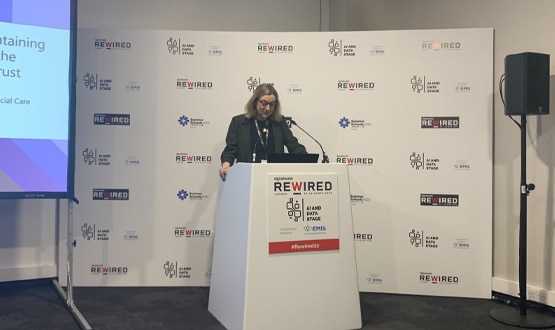Dr Nicola Byrne says data initiatives need to prove they are trustworthy
- 15 March 2022

The National Data Guardian (NDG) for Health and Social Care has told the Digital Health Rewired audience that data initiatives and organisations must ensure that they are able to demonstrate what they are doing with the information is ‘actually trustworthy’.
Dr Nicola Byrne, who was appointed as the NDG in March 2021, spoke at the event at the Business Design Centre on March 15 about issues surrounding trust when it comes to health data and more specifically, how this trust is maintained.
“How do we maintain trust? I think the overriding point I want to make is that it is not simply about being legally compliant, it is not enough for any data initiative or organisation to say, ‘well we met our legal obligations’,” she told the AI and Data Stage.
“Meeting legal obligations is obviously necessary but insufficient in condition to build public trust.
“More needs to be done to establish what you are doing with data is actually trustworthy.”
She added: “It is incredibly important for organisations and data initiatives, whether you’re a healthcare trust or you’re building an app, are you telling people enough information about what you are doing with your data, will they be surprised about how you are going to use it.
“And that comes onto the importance of engagement and communication, the one thing to avoid I think is a ‘nothing to see’ ‘don’t worry about it, trust us, it’s fine’.
“Nothing breeds suspicion more when you are told not to worry about something as we all know.”
Lessons learnt from GPDPR
Dr Byrne, who is the second person to take up the role of NDG following Dame Fiona Caldicott, who passed away in February 2021, also spoke about the GP Data for Planning and Research (GPDPR) programme.
GPDPR is a primary care data collection service which would see planners and researchers being given more secure access to a more comprehensive set of pseudonymised patient information. Originally planned to go live from 1 July 2021, concerns were raised about the programme and eventually led to the implementation date being moved to September. This date was later scrapped and instead data collection will now only begin once certain criteria have been met.
Dr Byrne told the audience that there were two main learning points to takeaway from the programme.
She said: “One is that, with hindsight, there was insufficient engagement with both the public and professionals about what the programme was trying to do, but also there was not enough understanding about what mattered to people, what people wanted to know, what concerns they might have about it, what safeguards might need to be in place for both the public and professionals to feel confident about it.
“And I think the second important point about that programme is the fact that it showed that trust is context specific and during the pandemic, we all know public data literacy and understanding has increased exponentially.
“The public get the importance of data for the use of research, how data is used to make the vaccine programme possible but that doesn’t mean that from now on the public will simply trust everything the government or health and care want to do with data.”
Taking place on March 15-16 at the Business Design Centre in London, Digital Health Rewired 2022 is a conference and exhibition which brings together all parts of the digital health community to celebrate the best of digital, data and innovation in health and care.
Health and care professionals will be able to network, collaborate and learn in person during two days of educational conference sessions, exhibitions and meetings, all focused on sharing best practice and innovation.
All the conference sessions will be CPD accredited.
While online registrations are now closed, you can still register at the door.



